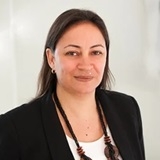EMRIP - Enhanced participation in the work of the Human Rights Council
A Statement by Aboriginal and Torres Strait Islander Social Justice Commissioner, Katie Kiss on Item 9
17th Session of the Expert Mechanism on the Rights of Indigenous Peoples (EMRIP)
Wednesday 10 July 2024
Thank you, Madam Chair,
I make this statement in my capacity as Australia’s Aboriginal and Torres Strait Islander Social Justice Commissioner, on behalf of the Australian Human Rights Commission, Australia’s National Human Rights Institution.
I would like to acknowledge all First Nations Peoples and Government representatives here today.
Madam Chair,
I know from the Australian context that there are very few First Nations organisations with ECOSOC consultative status accreditation to participate in UN fora such as the Human Rights Council meetings and it is clear that current structures governing Indigenous Peoples participation are insufficient.
Enhanced participation should be supported through:
- A formal, permanent mechanism for the accreditation, with a separate status, of Indigenous Peoples’ representatives and institutions which addresses the inequity under the current system whereby Indigenous people need accreditation by non-governmental organizations with consultative status with the Economic and Social Council in order to meaningfully participate.
- Provision for Indigenous Peoples themselves to identify which venues are most relevant to them and for their status as Indigenous Peoples representatives and institutions to allow them to participate in meetings concerning issues that, in their view, affect them.
In relation to the latter, I would also like to highlight the views of Pacific Indigenous Peoples Representative Mr Les Malezer at the discussion on venues of participation which was held on 21 November 2022. He noted that:
- In the transition from the Commission on Human Rights to the Human Rights Council, Indigenous Peoples had lost space for participation, and there were shortfalls ranging from the number of agenda items that they could have access to, to the issues that they could address, and the limited amount of speaking time available to them.
Mr Malezer also made the point that while the expert workshop concerned the work of the Human Rights Council in particular, the observations made could be extended to the General Assembly and to the United Nations system in general.
I endorse the eighteen recommendations from discussions of the Expert workshop on possible ways to enhance the participation of Indigenous Peoples in the work of the Human Rights Council Report which appear in the Office of the United Nations High Commissioner for Human Rights’ report of 11 April 2023 (A/HRC/53/44).
Of these, I would like to stress the importance of States taking measures to enhance the participation of Indigenous Peoples in UN fora, including through the allocation of sufficient resources for:
- enhanced participation of Indigenous Peoples’ representatives and institutions in the work of the Human Rights Council, and United Nations more broadly.
- supporting First Nations people to strengthen their capacities to engage with international human rights mechanisms, including through the development, revival and implementation of targeted human rights education programs.
In implementing these measures, it is critical that States are transparent in their actions and that they invest in self-determining processes.
Thank you.

